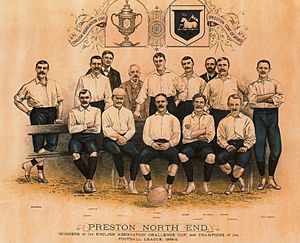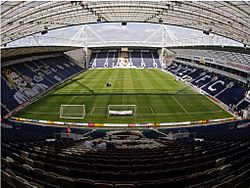Preston North End F.C. facts for kids
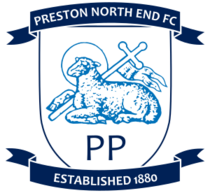 |
|||
| Full name | Preston North End Football Club | ||
|---|---|---|---|
| Nickname(s) | The Lilywhites, The Invincibles | ||
| Short name | PNE | ||
| Founded | 1880 | ||
| Ground | Deepdale | ||
| Capacity | 23,404 | ||
| Owner | Wordon Limited | ||
| Chairman | Craig Hemmings | ||
| Manager | Paul Heckingbottom | ||
| League | Championship | ||
| 2018–19 | Championship, 14th of 24 | ||
|
|
|||
Preston North End Football Club, often called Preston or PNE, is a professional association football team from Preston, Lancashire, England. They play in the EFL Championship, which is the second-highest football league in England.
Preston North End started as a cricket club in 1863. They have played at their home ground, Deepdale, since 1875. The club began playing football in 1878 to stay fit in winter. In May 1880, they officially became a football club. Deepdale is now the oldest football ground still used by a league club.
Preston North End was one of the first teams to join the Football League in 1888. In the 1888–89 season, they won both the first-ever league championship and the FA Cup. They won the FA Cup without letting any goals in! This made them the first team in English football to win the "Double" (both the league and the FA Cup in one season). Because they were unbeaten in all their matches that season, they are known as "The Invincibles".
Preston won the league championship again in 1889–90. Their only other major win since then was the 1938 FA Cup final against Huddersfield Town. Some of the club's most famous players include Sir Tom Finney, Alan Kelly Sr., and Bill Shankly. Deepdale has stands named after them to remember their contributions.
Until 1961, Preston usually played in the top league, the First Division. But after being moved down a league in the 1960–61 season, they have not returned to the top division. They have spent many seasons in the lower leagues. The club has also faced serious money problems and was almost shut down twice. Preston has been in the EFL Championship since 2015.
Contents
Club History and Achievements
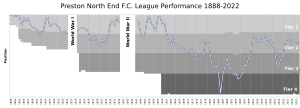
Preston North End began as a cricket club in 1863. They first played near the River Ribble in Preston. Later that year, they moved to Moor Park and called themselves "North End" because of their new location. On January 21, 1875, the club rented a field across from Moor Park. This spot is where the Deepdale stadium stands today, and it has been their home ever since.
The club tried playing rugby union in 1877 to keep fit in winter. But it wasn't very successful. A year later, they played their first game using the rules of association football. In May 1880, everyone agreed to focus on football, and Preston North End Football Club was officially created.
The "Invincibles" Era
Preston became one of the first professional clubs by hiring players from Scotland. These players were known as the Scotch Professors. In 1887, Preston beat Hyde 26–0 in the FA Cup. This is still the biggest winning score in English first-class football history! Scottish player Jimmy Ross scored eight goals in that match. He went on to score 19 goals in the competition that season, which is also still a record.
In the 1888–89 season, Preston made history. They became the first league champions and the first team to win "The Double". They are still the only team to go through an entire season unbeaten in both the league and the FA Cup. They even won the FA Cup without letting in a single goal! Most of their team were Scottish players, the "Scotch Professors". This amazing team became known as "The Invincibles".
Preston won the league championship again in 1889–90. However, they have not won the league title since then. They have finished as runners-up six times, including three years in a row from 1890-91 to 1892–93. They also finished second twice in the 1950s when Tom Finney was playing. The club's last major trophy was the 1938 FA Cup Final. They beat Huddersfield Town 1–0 in that game.
Famous Players and Recent Times
Preston's most famous player, Tom Finney, joined the club as a teenager in 1938. His first game was delayed until 1946 because of the Second World War. He played for Preston until he retired in 1960. People called him the "Preston Plumber" because he also had a plumbing business. Finney is still the club's top goalscorer, with 187 goals in 433 games. He also scored 30 goals for the England national team.
A year after Finney retired, Preston moved down to the Second Division. They have not played in the top division since. In the 1963–64 season, they had a great run. They finished third in the Second Division and reached the 1964 FA Cup Final. They lost a close match 3–2 to West Ham United.
Preston moved down to the Third Division after the 1969–70 season. They quickly got promoted back up. But since 1970, they have spent 28 out of 49 seasons in the bottom two divisions. This includes a long period of 19 seasons from 1981–1982 to 1999–2000. The club faced serious problems in the 1980s and was almost closed down. In the 1985–86 season, they finished very low in the Fourth Division.
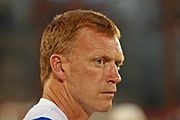
Under manager John McGrath, the team improved and got promoted back to the Third Division a year later. But they went back down again from 1993 to 1996. The club started to get better after a company called Baxi took over in 1994. In February 1998, their player David Moyes, who was 34, became manager. Moyes was very successful. He led the team to win the third tier championship in 2000. Preston reached the 2001 play-off final but lost to Bolton Wanderers. In the 2005 play-off final, under manager Billy Davies, Preston lost 1–0 to West Ham United.
After Baxi sold the club and Moyes left for Everton in 2002, the team stayed in the second division for most of the 2000s. But more problems came at the end of the decade. They faced tax issues in 2010 and moved down to the third division in 2011. A local businessman, Trevor Hemmings, helped solve the tax problem and bought the club in June 2010. The team was promoted again in 2015 through the play-offs. They have been in the EFL Championship since then. Their highest finish was 7th in the 2017–18 season.
Preston North End reached the 2024–25 FA Cup quarter-finals. However, they lost 3–0 against Aston Villa at Deepdale.
Deepdale Stadium
Deepdale has been the home of Preston North End since 1875, first for cricket and then for football from 1878. It is the oldest football ground in the world that has been continuously used by a club in a major league. The most people ever to watch a game there was 42,684. This happened during a match against Arsenal in April 1938.
When Baxi took over the club, they started a big project to make Deepdale a modern stadium. Between 1996 and 2009, the old ground was taken down and rebuilt in four parts. The last new stand opened in 2008. The stadium now has seats for 23,404 fans. The football pitch is 110 yards long and 75 yards wide.
Part of the improvements at Deepdale included the original National Football Museum. It opened at Deepdale in 2001. However, it later moved to Manchester in 2012.
The Tom Finney Statue
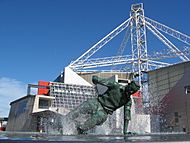
Outside the Sir Tom Finney Stand, there is a famous statue of the player Tom Finney. It is known as "The Splash" or the "Tom Finney Splash". The artist Peter Hodgkinson created the statue, and it was shown to the public in July 2004. The statue was inspired by a famous photo taken during a game between Chelsea and Preston in 1956. That game was played at Stamford Bridge in very wet conditions.
Historical Incident at Deepdale
In 1913, there was an attempt to damage the Deepdale ground. As part of a campaign for women's right to vote, some activists tried to burn down Deepdale's main stand. However, they were stopped. In the same year, activists did succeed in burning down Arsenal's stadium in South London. They also tried to burn down Blackburn Rovers' ground. These actions targeted sports that were mainly for men to protest against male dominance in society.
Team Colors and Sponsors
Preston North End traditionally wears white shirts with blue shorts for their home games. Yellow is a common color for Preston's away kit. The club has had different main sponsors on their shirts since 1979.
| Years | Sponsor(s) |
|---|---|
| 1979–1984 | Pontins |
| 1984–1985 | David Leil |
| 1985–1986 | Lombard Continental |
| 1986–1990 | Garratt's Insurance |
| 1990–1992 | Ribble Valley Shelving |
| 1992–1995 | Coloroll |
| 1995–2002 | Baxi |
| 2002–2005 | New Reg |
| 2005–2010 | Enterprise |
| 2010–2012 | Tennent's |
| 2012–2013 | Magners |
| 2013–2014 | The Football Pools/Carers Trust |
| 2014–2016 | Virgin Trains |
| 2016–2017 | 888sport |
| 2017–2018 | Tempobet |
| 2018–2021 | 32Red |
| 2021–2025 | PAR Group |
| 2025- | Spudbros |
Club Rivalries
Preston North End's biggest rival is Blackpool. Their stadiums are only seventeen miles apart. The "West Lancashire derby" between these two clubs has been played 96 times since 1901. Preston also has local rivalries with other teams like Blackburn Rovers, Burnley, Bolton Wanderers, and Wigan Athletic.
Current Players
|
|
Players on Loan
|
Past Players
Club Staff
Here is a list of the non-playing staff at Preston North End:
| Name | Role |
|---|---|
| Paul Heckingbottom | Manager |
| Stuart McCall | Assistant Manager |
| Jason Euell | First Team coach |
| Peter Murphy | First Team Coach |
| Mike Pollitt | Goalkeeping Coach |
| Andy Liddell | Fitness Coach |
| James Wallace | Head of Recruitment |
| Tom Reeves | Chief Scout |
| Ben Smith | Recruitment Analyst |
| Matt Jackson | Head of Medicine |
| Nick Harrison | Academy Manager |
| Andy Livingstone | Head of Academy Recruitment |
| Paul Huddy | Kitman |
Club Records
- Most Goals (Overall): Tom Finney, 210 goals from 473 games.
- Most League Goals: Tom Finney, 187 goals from 433 league games.
- Most Appearances (Overall): Alan Kelly, Sr., 511 games (between 1958 and 1973).
- Most League Goals in a Season: Ted Harper, 37 goals in the Football League Second Division, 1932–33.
- Record Attendance: 42,684 fans against Arsenal, Football League First Division, April 23, 1938.
- Record Cup Victory: 26–0 against Hyde, FA Cup, October 15, 1887.
- Record League Victory: 10–0 against Stoke, Football League Division One, September 14, 1889.
- Record Defeat: 0–7 against Blackpool, Division 1, May 1, 1948.
- Transfer Record (Paid): £2,130,000 for Milutin Osmajić from Cádiz CF, August 2023.
- Transfer Record (Received): £10,000,000 for Jordan Hugill to West Ham Utd, January 2018.
- Youngest Ever Player: Ethan Walker at 16 years and 156 days old.
- Oldest Ever Player: Bob Kelly at 41 years and two months old.
Club Honours (Trophies Won)
In 1996, when Preston won the Third Division title, they became one of only a few clubs to have won each of the top four professional football leagues in England.
League Titles
- First Division (top league)
- Champions: 1888–89, 1889–90
- Runners-up: 1890–91, 1891–92, 1892–93, 1905–06, 1952–53, 1957–58
- Second Division (second league)
- Champions: 1903–04, 1912–13, 1950–51
- Runners-up: 1914–15, 1933–34
- Third Division / Second Division / League One (third league)
- Champions: 1970–71, 1999–2000
- Play-off winners: 2015
- Fourth Division / Third Division (fourth league)
- Champions: 1995–96
- Runners-up: 1986–87
Cup Competitions
- FA Cup
- Winners: 1888–89, 1937–38
- Runners-up: 1887–88, 1921–22, 1936–37, 1953–54, 1963–64
- FA Charity Shield
- Runners-up: 1938
- Football League War Cup
- Winners: 1940–41
- Lancashire Senior Cup
- Winners: 1886–87, 1892–93, 1894–95, 1899–1900, 1938–39, 1996–97
Women's Football Team
The women's football team that used to be connected with Preston North End was called Preston North End W.F.C.. In May 2016, they changed their name to Fylde Ladies F.C. and became associated with National League North team AFC Fylde.
See also
 In Spanish: Preston North End Football Club para niños
In Spanish: Preston North End Football Club para niños


